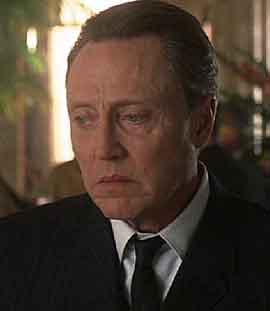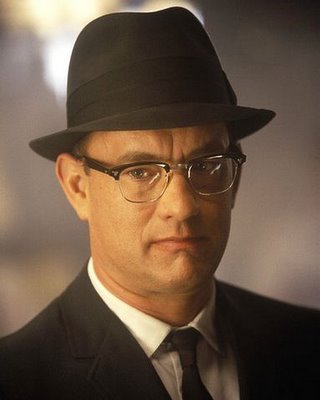
After a number of near-hits and missed opportunities, I finally watched Catch Me If You Can (2002), Steven Spielberg's movie about Frank Abagnale, Jr., a teenage Great Imposter depicted with enthusiasm and finesse by Leonardo DiCaprio, who proves--and this may seem painfully obvious, but I still think it's a real accomplishment--he will always be able to convincingly portray a sixteen-year-old. His performance draws us into Frank's slippery world, one that is breathless and giddy, but also "sad, sad, sad." I was happy simply to enjoy the hijinks and Tom Hanks' funny-freaky Carl Hanratty, the FBI man who pursues Abagnale and his paper-hanging across the US and Over There--and then, as happens so often in Spielberg movies, I was caught short by the pain he always inflicts on his protagonists, who find themselves cut loose from family, from father and/or mother. The pursued pursues, searching desperately for the lost parent.
 It's a role-reversal of fabulous proportions, as Frank Junior becomes Hansel-Gretel, Snow White, maybe even (gulp) Oedipus, while the menacing forest clutches at the hem of the child hobbled with a crooked foot and faultless fate. Spielberg returns again and again to these lost children. There's Elliott in E.T. (1982), fatherless, trying to figure out how to grow up, until he rescues and is rescued by something that acts as both better self and parent. And also Celie in The Color Purple (1985), whose haunted wood is the American South, where she waits for her African angels to fly her home. And of course Pan in Hook (1991) and Jamie in Empire of the Sun (1987) and David in A.I. (2001), and even Indy, whose Last Crusade (1989) is to reunite with his father--all Lost Boys and Supertoys, alone and searching for themselves in their parents. Even Tom Cruise in Minority Report (2002) and War of the Worlds (2005) pitches in to build this fable, but from the parent's perspective, as he seeks to regain his own Lost Boy.
It's a role-reversal of fabulous proportions, as Frank Junior becomes Hansel-Gretel, Snow White, maybe even (gulp) Oedipus, while the menacing forest clutches at the hem of the child hobbled with a crooked foot and faultless fate. Spielberg returns again and again to these lost children. There's Elliott in E.T. (1982), fatherless, trying to figure out how to grow up, until he rescues and is rescued by something that acts as both better self and parent. And also Celie in The Color Purple (1985), whose haunted wood is the American South, where she waits for her African angels to fly her home. And of course Pan in Hook (1991) and Jamie in Empire of the Sun (1987) and David in A.I. (2001), and even Indy, whose Last Crusade (1989) is to reunite with his father--all Lost Boys and Supertoys, alone and searching for themselves in their parents. Even Tom Cruise in Minority Report (2002) and War of the Worlds (2005) pitches in to build this fable, but from the parent's perspective, as he seeks to regain his own Lost Boy.In Catch Me If You Can, Spielberg almost abandons the film's core--the cat-and-mouse of a great con artist and an equally great plodder trying to Get His Man--and asks us to stop and watch how Frank becomes what he is in an attempt to emulate his father, and how he raises the stakes to restore his divorcing parents, until he finally does find his father, in the person of Hanratty, the jubilant square who adopts his quarry, replacing the father (played by Christopher Walken, as usual completely satisfying in his self-assured ability to appropriate the role). As Hanratty closes in, he also gets closer to Frank, eventually becoming the protector, colleague, even, it seems, proud dad.
 I was relieved Spielberg gives Frank a father. The anxiety DiCaprio projects seemed to me a preview of the OCD doom he would bring to The Aviator two years later for Scorsese, almost unwatchable in its sense of imminent, intimate nervous collapse. (It is a pain I think captured best in the image from The Aviator of Hughes washing his hands with such futile purgative fervor that he cuts himself. The urge to be complete expressed in extremis.) With his All-American American openness coupled with the most expressive eyes in Hollywood--at once capable of a hundred-yard stare and an aw-garsh twinkle--in Catch Me If You Can DiCaprio perfectly captures the requisite yearning one needs to play a Spielberg orphan. I think it's telling that the movie is based on a true story; it gives Spielberg the kind of journalistic "realism" lacking in his more heavily metaphorical attempts at telling his ur-story of abandoned children who search for home.
I was relieved Spielberg gives Frank a father. The anxiety DiCaprio projects seemed to me a preview of the OCD doom he would bring to The Aviator two years later for Scorsese, almost unwatchable in its sense of imminent, intimate nervous collapse. (It is a pain I think captured best in the image from The Aviator of Hughes washing his hands with such futile purgative fervor that he cuts himself. The urge to be complete expressed in extremis.) With his All-American American openness coupled with the most expressive eyes in Hollywood--at once capable of a hundred-yard stare and an aw-garsh twinkle--in Catch Me If You Can DiCaprio perfectly captures the requisite yearning one needs to play a Spielberg orphan. I think it's telling that the movie is based on a true story; it gives Spielberg the kind of journalistic "realism" lacking in his more heavily metaphorical attempts at telling his ur-story of abandoned children who search for home.
No comments:
Post a Comment